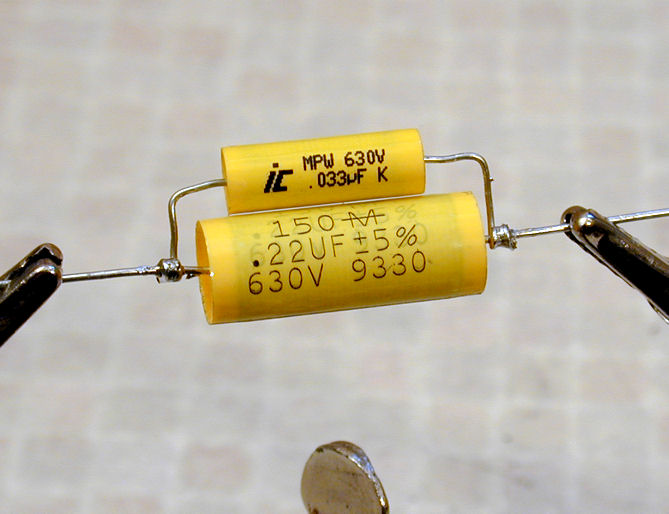Hi, does someone have experience if two DC coupling capacitors in parallel sound better or not than one capacitor equal to their summed value?
This could be by mixing:
1) same type-same brand, or
2) same type-different brand, or
3) different type-different brand, or
4) same-type different values (1:1/10th)

Image property: (c) Philip I. Nelson "http://antiqueradio.org/recap.htm"
This could be by mixing:
1) same type-same brand, or
2) same type-different brand, or
3) different type-different brand, or
4) same-type different values (1:1/10th)

Image property: (c) Philip I. Nelson "http://antiqueradio.org/recap.htm"
Two identical caps in parallel with very short (and identical) wiring would sound more or less exactly the same as one cap with twice the value of each.
Two different caps in parallel or with different length wires bring the risk of parallel resonances which could affect HF performance.
Making up a required cap value from two caps in parallel is likely to increase the surface area and so increase stray capacitance to other circuit nodes. Only a good idea when you need a specific value (e.g. RIAA network); not relevant to coupling caps as the value is never that critical. Why do you ask the question?
Two different caps in parallel or with different length wires bring the risk of parallel resonances which could affect HF performance.
Making up a required cap value from two caps in parallel is likely to increase the surface area and so increase stray capacitance to other circuit nodes. Only a good idea when you need a specific value (e.g. RIAA network); not relevant to coupling caps as the value is never that critical. Why do you ask the question?
To add to what DF96 said, the example in the photograph uses two totally different capacitor values. This will have almost no effect on the audio since the larger capacitor will always dominate. It's like putting a car jack on a cardboard box and expecting to be able to lift your car twice as high.
You have chosen a poor example (and that's an understatement), because both your caps are the same colour, so it will heavily colour (duh!!!) audio going through them.
Next time pick *complementary* colours instead, so they compensate each other.
Some suggested opposite/complementary/neutralizing combinations:
RED ------------ CYAN
GREEN ---------- MAGENTA
BLUE ----------- YELLOW
Next time pick *complementary* colours instead, so they compensate each other.
Some suggested opposite/complementary/neutralizing combinations:
RED ------------ CYAN
GREEN ---------- MAGENTA
BLUE ----------- YELLOW
- Status
- Not open for further replies.